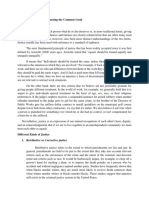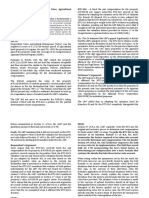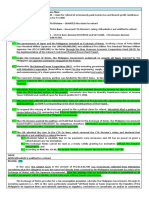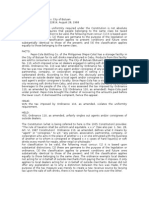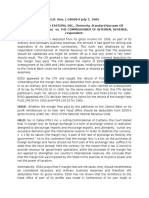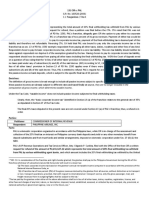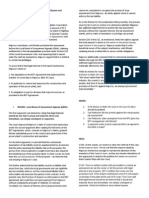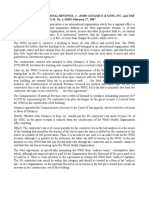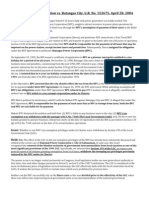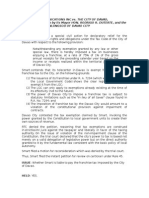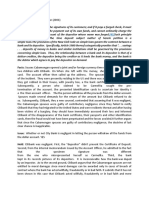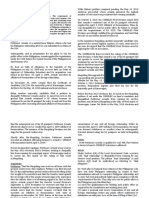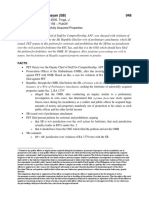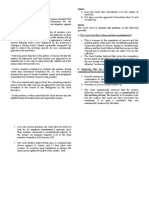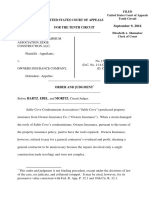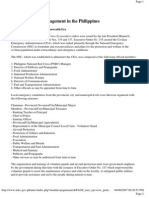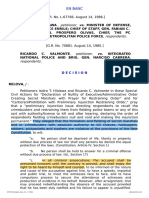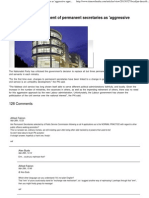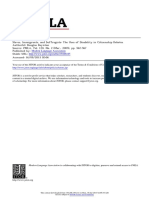100%(2)100% found this document useful (2 votes)
1K viewsSmart Vs City of Davao
Smart Vs City of Davao
Uploaded by
GR1. Smart Communications filed a case claiming exemption from Davao City's franchise tax under its legislative franchise.
2. The Supreme Court ruled that Smart is liable to pay the tax, finding that the LGC allows local franchise taxes and Smart's franchise does not clearly exempt it from local taxes.
3. While Smart argued its franchise exempted it from the LGC, the Court found the franchise language ambiguous and construed it strictly against Smart, determining it only exempted Smart from national franchise taxes.
Copyright:
© All Rights Reserved
Available Formats
Download as DOCX, PDF, TXT or read online from Scribd
Smart Vs City of Davao
Smart Vs City of Davao
Uploaded by
GR100%(2)100% found this document useful (2 votes)
1K views3 pages1. Smart Communications filed a case claiming exemption from Davao City's franchise tax under its legislative franchise.
2. The Supreme Court ruled that Smart is liable to pay the tax, finding that the LGC allows local franchise taxes and Smart's franchise does not clearly exempt it from local taxes.
3. While Smart argued its franchise exempted it from the LGC, the Court found the franchise language ambiguous and construed it strictly against Smart, determining it only exempted Smart from national franchise taxes.
Original Description:
Digest
Original Title
Smart vs City of Davao
Copyright
© © All Rights Reserved
Available Formats
DOCX, PDF, TXT or read online from Scribd
Share this document
Did you find this document useful?
Is this content inappropriate?
1. Smart Communications filed a case claiming exemption from Davao City's franchise tax under its legislative franchise.
2. The Supreme Court ruled that Smart is liable to pay the tax, finding that the LGC allows local franchise taxes and Smart's franchise does not clearly exempt it from local taxes.
3. While Smart argued its franchise exempted it from the LGC, the Court found the franchise language ambiguous and construed it strictly against Smart, determining it only exempted Smart from national franchise taxes.
Copyright:
© All Rights Reserved
Available Formats
Download as DOCX, PDF, TXT or read online from Scribd
Download as docx, pdf, or txt
100%(2)100% found this document useful (2 votes)
1K views3 pagesSmart Vs City of Davao
Smart Vs City of Davao
Uploaded by
GR1. Smart Communications filed a case claiming exemption from Davao City's franchise tax under its legislative franchise.
2. The Supreme Court ruled that Smart is liable to pay the tax, finding that the LGC allows local franchise taxes and Smart's franchise does not clearly exempt it from local taxes.
3. While Smart argued its franchise exempted it from the LGC, the Court found the franchise language ambiguous and construed it strictly against Smart, determining it only exempted Smart from national franchise taxes.
Copyright:
© All Rights Reserved
Available Formats
Download as DOCX, PDF, TXT or read online from Scribd
Download as docx, pdf, or txt
You are on page 1of 3
Fiscal Autonomy and Self Reliance of LGU’s d.
the imposition of franchise tax by the City of Davao would amount to a
G.R. no.155491 – September 16, 2008 violation of the constitutional provision against impairment of contracts.
Smart Communications vs City of Davao 3. The City of Davao, in its Answer, contested the tax exemption claimed by Smart. They
NACHURA, J. invoked the power granted by the Constitution to local government units to create
their own sources of revenue.
Smart filed a petition for declaratory relief before the court, claiming that the in lieu of all 4. The RTC denied the petition of Smart, noting the ambiguity of the in lieu of all taxes
taxes clause under its legislative franchise grants it an exemption from local franchise tax provision in the franchise.
that Davao City is collecting from it. The Court reiterated the power of local government a. Tax exemptions are construed strictissimi juris against the taxpayer, and
units to collect local taxes, including franchises. It also found that the language of its liberally in favor of the taxing authority. Those who assert a tax exemption
franchise is not clear what type of taxes Smart is exempted from. This uncertainty must be must justify it with words too plain to be mistaken and too categorical not to
construed strictly against the taxpayer, and liberally in favor of the government. be misinterpreted.
b. the city’s power to tax is based not merely on a valid delegation of legislative
power but on the direct authority granted to it by the fundamental law.
DOCTRINE 5. Thus this case to the SC.
Section 137, in relation to Section 151 of the LGC, allowed the imposition of franchise
tax by the local government units (see Other Notes for the exact language of the law). ISSUE with HOLDING
1. WoN Smart is liable to pay the franchise tax imposed by the city of Davao. YES.
Section 193 thereof provided for the withdrawal of tax exemption privileges granted a. Section 137, in relation to Section 151 of the LGC, allowed the imposition
prior to the issuance of R.A. No. 7160 except for those expressly mentioned therein. of franchise tax by the local government units; while Section 193 thereof
provided for the withdrawal of tax exemption privileges granted prior to
FACTS the issuance of R.A. No. 7160 except for those expressly mentioned therein.
1. Smart filed a special civil action for declaratory relief for the ascertainment of its b. Smart is correct in arguing that the withdrawal of tax exemptions under the
rights and obligations under the Tax Code of the City of Davao, which reads: LGC can only affect those franchises granted prior to the effectivity of the
a. “Notwithstanding any exemption granted by any law or other special law, law.
there is hereby imposed a tax on businesses enjoying a franchise, at a rate c. However, Smart is wrong in saying that their franchise exempts them from
of seventy-five percent (75%) of one percent (1%) of the gross annual local taxation.
receipts for the preceding calendar year based on the income or receipts i. Their legislative franchise under RA 7294 imposes a franchise tax
realized within the territorial jurisdiction of Davao City.” of 3% of all gross receipts transacted under the franchise, and the
2. Smart argues that: said percentage shall be in lieu of all taxes on the franchise or
a. Its legislative franchise was issued after the LGC was enacted. This shows earnings thereof.
the clear legislative intent of Congress to exempt it from the provisions of the ii. It does not expressly provide what kind of taxes Smart is
LGC. exempted from. It is not clear whether the in lieu of all taxes
b. Sec. 137 of the LGC, which allows for the imposition of franchise tax by provision in the franchise of Smart would include exemption
LGU’s, can only apply to exemptions already existing at the time of its from local or national taxation. What is clear is that Smart shall
effectivity, and not to future exemptions. pay franchise tax.
c. The power of the City of Davao to impose a franchise tax is subject to iii. This uncertainty must be construed strictly against Smart which
statutory limitations such as the in lieu of all taxes clause1 in the franchise claims the exemption. Smart has the burden of proving that,
of Smart. aside from the imposed 3% franchise tax; Congress intended it to
be exempt from all kinds of franchise taxes whether local or
1
national. However, Smart failed in this regard.
Section 9. Tax provisions. The grantee, its successors or assigns shall be liable to pay the d. Thus, the doubt must be resolved in favor of the City of Davao. The in lieu of
same taxes on their real estate buildings and personal property, exclusive of this franchise, as all taxes clause applies only to national internal revenue taxes and not to
other persons or corporations which are now or hereafter may be required by law to pay. In
local taxes.
addition thereto, the grantee, its successors or assigns shall pay a franchise tax
equivalent to three percent (3%) of all gross receipts of the business transacted under
i. If Congress intended the "in lieu of all taxes" clause in Smart's
this franchise by the grantee, its successors or assigns and the said percentage shall be franchise to also apply to local taxes, Congress would have
in lieu of all taxes on this franchise or earnings thereof: Provided, That the grantee, its expressly mentioned the exemption from municipal and provincial
successors or assigns shall continue to be liable for income taxes payable under Title II of the taxes.
National Internal Revenue Code pursuant to Section 2 of Executive Order No. 72 unless the e. However, the in lieu of all taxes clause in R.A. No. 7294 has become functus
latter enactment is amended or repealed, in which case the amendment or repeal shall be officio (of no legal effect) with the abolition of the franchise tax on
applicable thereto. telecommunications companies.
i. The LGC, as amended by the Expanded Value Added Tax Law
The grantee shall file the return with and pay the tax due thereon to the Commissioner of (RA 8241) expressly repealed the provisions of all special laws
Internal Revenue or his duly authorized representative in accordance with the National Internal
Revenue Code and the return shall be subject to audit by the Bureau of Internal Revenue
1
relative to rate of franchise taxes, and other laws, orders, No. 7229, no other franchise tax may be collected from Globe regardless of
issuances, rules and regulations inconsistent with it. who the taxing power is.
ii. As admitted by Smart in its pleadings, it is no longer paying the 3% i. No such provision is found in the franchise of Smart; the kind of tax
franchise tax mandated in its franchise. Currently, Smart along from which it is exempted is not clearly specified.
with other telecommunications companies pays the uniform 10%
value-added tax. 5. WoN the imposition of local franchise tax by the City of Davao would violate the
iii. In effect, the in lieu of all taxes clause in R.A. No. 7294 was constitutional prohibition against impairment of contracts. NO.
rendered ineffective by the advent of the VAT Law. a. As already mentioned, the franchise of Smart does not expressly provide for
exemption from local taxes.
2. WoN the Opinion of the Bureau of Local Government and Finance (BLGF) is b. Moreover, Smarts franchise was granted with the express condition that it is
conclusive on the court. NO. subject to amendment, alteration, or repeal.
a. The BLGF is not an administrative agency whose findings on questions of c. The parties to a contract cannot fetter the exercise of the taxing power of the
fact are given weight and deference in the courts. State.
b. The BLGF was created merely to provide consultative services and i. Not only are existing laws read into contracts in order to fix
technical assistance to local governments and the general public on local obligations as between parties, but the reservation of essential
taxation, real property assessment, and other related matters, among attributes of sovereign power is also read into contracts as a basic
others. postulate of the legal order.
c. The question before the court however is a legal question pertaining to the
interpretation of Smart’s legislative franchise. There is, therefore, no basis
for claiming expertise for the BLGF that administrative agencies are said to DISPOSITIVE PORTION
possess in their respective fields. WHEREFORE, the instant petition is DENIED for lack of merit. Costs against
petitioner.
3. WoN the in lieu of all taxes clause in the franchise partakes of the nature of a tax
exclusion. There is no essential difference. SO ORDERED.
a. Smart argues that it is given a tax exclusion, and not an exemption, since it
still pays other taxes (like income tax or real property tax). OTHER NOTES
b. An exemption is an immunity or a privilege; it is the freedom from a charge Section 137. Franchise Tax. Notwithstanding any exemption granted by any law or other
or burden to which others are subjected. special law, the province may impose a tax on businesses enjoying a franchise, at the rate
c. An exclusion on the other hand, is the removal of otherwise taxable items not exceeding fifty percent (50%) of one percent (1%) of the gross annual receipts for the
from the reach of taxation, e.g., exclusions from gross income and allowable preceding calendar year based on the incoming receipt, or realized, within its territorial
deductions. jurisdiction.
i. An exclusion is, thus, still an immunity which frees a taxpayer from
a charge to which others are subjected. It is still interpreted In the case of a newly started business, the tax shall not exceed one-twentieth (1/20) of
strictissimi juris against the taxpayer and liberally in favor of one percent (1%) of the capital investment. In the succeeding calendar year, regardless of
the government. when the business started to operate, the tax shall be based on the gross receipts for the
preceding calendar year, or any fraction thereon, as provided herein.
4. WoN the local tax exemption in the legislative franchise of Globe (RA 7925)2 is
automatically incorporated in the franchise of Smart. NO.
a. Congress, in approving the tax exemption in R.A. No. 7925, did not intend it Section 151. Scope of Taxing Powers. Except as otherwise provided in this Code, the city
to operate as a blanket tax exemption to all telecommunications entities. may levy the taxes, fees, and charges which the province or municipality may impose:
b. The language of the law and the proceedings of Congress have nothing that Provided, however, That the taxes, fees and charges levied and collected by highly
would signify the grant of tax exemptions to all telecomm entities. urbanized and independent component cities shall accrue to them and distributed in
c. The grant of exemption to Globe from municipal, provincial, or national is accordance with the provisions of this Code.
clear and categorical. Aside from the franchise tax collected by virtue of R.A.
The rates of taxes that the city may levy may exceed the maximum rates allowed for the
province or municipality by not more than fifty percent (50%) except the rates of
professional and amusement taxes.
2
“(b) The grantee shall further pay to the Treasurer of the Philippines each year after the audit
and approval of the accounts as prescribed in this Act, one and one-half per centum of all gross
receipts from business transacted under this franchise by the said grantee in the Philippines, in Section 193. Withdrawal of Tax Exemption Privileges. Unless otherwise provided in this
lieu of any and all taxes of any kind, nature or description levied, established or collected by any Code, tax exemptions or incentives granted to, or presently enjoyed by all persons,
authority whatsoever, municipal, provincial or national, from which the grantee is hereby whether natural or juridical, including government-owned or controlled corporations, except
expressly exempted, effective from the date of the approval of Republic Act Numbered Sixteen local water districts, cooperatives duly registered under RA No. 6938, non-stock and non-
hundred eighteen”
2
profit hospitals and educational institutions, are hereby withdrawn upon the effectivity of
this Code. (Emphasis supplied.)
DIGESTER: Xave Libardo
You might also like
- Mactan Cebu Airport Authority Vs MarcosDocument2 pagesMactan Cebu Airport Authority Vs Marcos上原クリス100% (2)
- Marcos II Vs CA Case DigestDocument2 pagesMarcos II Vs CA Case Digestlucky javellana100% (3)
- Justice and Fairness: Promoting The Common GoodDocument11 pagesJustice and Fairness: Promoting The Common GoodErika Mae Isip50% (2)
- CIR Vs General Foods DigestDocument1 pageCIR Vs General Foods DigestCJNo ratings yet
- Pepsi-Cola v. TanauanDocument2 pagesPepsi-Cola v. TanauanIshNo ratings yet
- GULF AIR vs. CIRDocument3 pagesGULF AIR vs. CIRAlyssa Clarizze MalaluanNo ratings yet
- CIR V CA, CTA, YMCADocument2 pagesCIR V CA, CTA, YMCAChil Belgira100% (3)
- Smart Communications, Inc. vs. Municipality of Malvar, BatangasDocument3 pagesSmart Communications, Inc. vs. Municipality of Malvar, BatangasRaquel Doquenia100% (2)
- 28 Municipality of Cainta Vs City of PasigDocument2 pages28 Municipality of Cainta Vs City of Pasighigoremso giensdks100% (3)
- City Assessor of Cebu City vs. Association of Benevola de Cebu 152904Document1 pageCity Assessor of Cebu City vs. Association of Benevola de Cebu 152904magenNo ratings yet
- Lung Center v. Quezon City DIGESTDocument2 pagesLung Center v. Quezon City DIGESTJor LonzagaNo ratings yet
- 22 - Consti2-Manila Electric V Yatco GR 45697 - DigestDocument1 page22 - Consti2-Manila Electric V Yatco GR 45697 - DigestOjie SantillanNo ratings yet
- Civil Procedure ReviewerDocument256 pagesCivil Procedure ReviewerGR100% (1)
- Land Bank v. YatcoDocument3 pagesLand Bank v. YatcoGRNo ratings yet
- Subido vs. CADocument4 pagesSubido vs. CAGR100% (1)
- Case Digest Cir vs. BoacDocument1 pageCase Digest Cir vs. BoacAnn SC100% (5)
- Commissioner of Internal Revenue Vs Isabela Cultural CorporationDocument2 pagesCommissioner of Internal Revenue Vs Isabela Cultural CorporationKim Lorenzo Calatrava100% (6)
- Atlas Vs CIRDocument2 pagesAtlas Vs CIRRoyalhighness18No ratings yet
- TAX 2: Digest - Winebrenner & Iñigo Insurance Brokers, Inc. v. CIRDocument2 pagesTAX 2: Digest - Winebrenner & Iñigo Insurance Brokers, Inc. v. CIRFaith Marie Borden100% (2)
- Mitsubishi v. CIRDocument2 pagesMitsubishi v. CIRSophiaFrancescaEspinosa100% (1)
- Digest CEPALCO Vs City of CDODocument2 pagesDigest CEPALCO Vs City of CDOPrecious AnneNo ratings yet
- Diaz Vs Secretary of FinanceDocument3 pagesDiaz Vs Secretary of FinanceJoshua Shin100% (5)
- China Banking Corporation v. Commissioner of Internal Revenue DigestDocument2 pagesChina Banking Corporation v. Commissioner of Internal Revenue DigestJLNo ratings yet
- Luzon Stevedoring Corp vs. CTADocument2 pagesLuzon Stevedoring Corp vs. CTAmaximum jicaNo ratings yet
- Pepsi-Cola Vs Municipality of Tanauan DigestDocument3 pagesPepsi-Cola Vs Municipality of Tanauan DigestRyan Acosta100% (1)
- CD - 81. Allied Banking v. Quezon CityDocument2 pagesCD - 81. Allied Banking v. Quezon CityCzarina CidNo ratings yet
- DIAZ AND TIMBOL v. SECRETARY OF FINANCE AND THE COMMISSIONER OF INTERNAL REVENUEDocument2 pagesDIAZ AND TIMBOL v. SECRETARY OF FINANCE AND THE COMMISSIONER OF INTERNAL REVENUERose De JesusNo ratings yet
- China Banking Corporation v. CIRDocument2 pagesChina Banking Corporation v. CIRRaymond Cheng80% (5)
- Pfda Vs NavotasDocument1 pagePfda Vs NavotasbaijamNo ratings yet
- RCBC V CIRDocument2 pagesRCBC V CIRMarife Minor100% (1)
- ANPC v. BIR and CIR v. PAGCORDocument2 pagesANPC v. BIR and CIR v. PAGCORDerek C. Egalla100% (2)
- 35 GR 175772 Mitsubishi vs. CIRDocument2 pages35 GR 175772 Mitsubishi vs. CIRJoshua Erik Madria100% (1)
- CIR V Solidbank CorporationDocument1 pageCIR V Solidbank CorporationFrancis Ray Arbon FilipinasNo ratings yet
- CIR vs. St. Luke's Medical CenterDocument2 pagesCIR vs. St. Luke's Medical CenterTogz Mape100% (1)
- Silkair vs. CirDocument2 pagesSilkair vs. CirKath Leen100% (1)
- Pepsi Cola v. City of Butuan DigestDocument2 pagesPepsi Cola v. City of Butuan DigestAnonymous PbYTL9zzco100% (1)
- CIR vs. ST Lukes DigestDocument2 pagesCIR vs. ST Lukes DigestKath Leen100% (4)
- Chevron v. CIRDocument2 pagesChevron v. CIRannedefrancoNo ratings yet
- China Banking Corporation Vs CADocument2 pagesChina Banking Corporation Vs CARahl SulitNo ratings yet
- CIR v. CADocument2 pagesCIR v. CAKristina Karen100% (1)
- Esso Standard Eastern, Inc Vs CirDocument2 pagesEsso Standard Eastern, Inc Vs CirCeresjudicata100% (1)
- Ericsson Vs City of PasigDocument3 pagesEricsson Vs City of PasigRaymond RoqueNo ratings yet
- PLDT vs. City of Davao DigestDocument2 pagesPLDT vs. City of Davao DigestMa Gabriellen Quijada-TabuñagNo ratings yet
- CIR Vs Fortune Tobacco DigestDocument2 pagesCIR Vs Fortune Tobacco DigestCJ67% (6)
- Mangwang - Deutsche Knowledge Services Vs Cir - GR No 197980Document1 pageMangwang - Deutsche Knowledge Services Vs Cir - GR No 197980トレンティーノ アップルNo ratings yet
- Philippine Acetylene Co. Inc vs. CirDocument2 pagesPhilippine Acetylene Co. Inc vs. Cirbrendamanganaan100% (1)
- Cir v. Pal DigestDocument4 pagesCir v. Pal DigestkathrynmaydevezaNo ratings yet
- Cocacola Vs ToledoDocument2 pagesCocacola Vs ToledoPia SottoNo ratings yet
- Allied Banking Vs The Quezon City Government, Et Al. (G.R. No. 154126, OCTOBER 11, 2005) FactsDocument1 pageAllied Banking Vs The Quezon City Government, Et Al. (G.R. No. 154126, OCTOBER 11, 2005) FactsHonorio Bartholomew Chan100% (1)
- NPC v. City of Cabanatuan-DigestDocument2 pagesNPC v. City of Cabanatuan-DigestMartel John Milo100% (1)
- G.R. No. L-53961Document1 pageG.R. No. L-53961Jannie Ann DayandayanNo ratings yet
- National Power Corporation Vs Province of Quezon and Municipality of Pagbilao DigestDocument2 pagesNational Power Corporation Vs Province of Quezon and Municipality of Pagbilao DigestNic NalpenNo ratings yet
- 11 NDC V CIRDocument3 pages11 NDC V CIRTricia MontoyaNo ratings yet
- 022 Cir vs. Marubeni Corporation GR No. 137377Document1 page022 Cir vs. Marubeni Corporation GR No. 137377Anonymous MikI28PkJcNo ratings yet
- Cir V Gotamco DigestDocument1 pageCir V Gotamco DigestDee LMNo ratings yet
- British American Tobacco v. Camacho Case DigestDocument3 pagesBritish American Tobacco v. Camacho Case DigestMak Francisco100% (1)
- Petron V TiangcoDocument1 pagePetron V TiangcoAleli Joyce Bucu100% (1)
- LRTA vs. CBAADocument2 pagesLRTA vs. CBAAKath LeenNo ratings yet
- CIR Vs The Estate of TodaDocument3 pagesCIR Vs The Estate of TodaLDNo ratings yet
- Digest - Batangas Power vs. Batangas CityDocument2 pagesDigest - Batangas Power vs. Batangas CityPaul Vincent Cunanan100% (2)
- Smart vs. City of DavaoDocument2 pagesSmart vs. City of DavaoIsay YasonNo ratings yet
- Smart v. Davao CityDocument3 pagesSmart v. Davao CityMikee FilartNo ratings yet
- City of Iloilo vs. Smart CommunicationsDocument2 pagesCity of Iloilo vs. Smart CommunicationsKim SimagalaNo ratings yet
- Smart vs. City of DavaoDocument3 pagesSmart vs. City of DavaoEly R. Barretto100% (1)
- Macalincag v. ChangDocument1 pageMacalincag v. ChangGRNo ratings yet
- Columbia Law Review Association, Inc. Columbia Law ReviewDocument29 pagesColumbia Law Review Association, Inc. Columbia Law ReviewGRNo ratings yet
- Citibank NA v. CabamonganDocument2 pagesCitibank NA v. CabamonganGRNo ratings yet
- Banking Quizlet MidtermsDocument6 pagesBanking Quizlet MidtermsGRNo ratings yet
- California Manufacturing Company Inc. v. Advanced TechnologyDocument2 pagesCalifornia Manufacturing Company Inc. v. Advanced TechnologyGR100% (4)
- PrIL Finals Reviewer IshDocument107 pagesPrIL Finals Reviewer IshPio Guieb AguilarNo ratings yet
- DILAG Transportation Law Quick Guide 1 PDFDocument57 pagesDILAG Transportation Law Quick Guide 1 PDFGRNo ratings yet
- UP Law Tax 2 Syllabus Estate TaxDocument6 pagesUP Law Tax 2 Syllabus Estate TaxGRNo ratings yet
- Columbia Law Review Association, Inc. Columbia Law ReviewDocument29 pagesColumbia Law Review Association, Inc. Columbia Law ReviewGRNo ratings yet
- China Banking Corporation v. CADocument3 pagesChina Banking Corporation v. CAGRNo ratings yet
- CIR v. FisherDocument1 pageCIR v. FisherGRNo ratings yet
- Ejercito v. SandiganbayanDocument3 pagesEjercito v. SandiganbayanGRNo ratings yet
- Consolidated Bank and Trust Corporation v. CADocument2 pagesConsolidated Bank and Trust Corporation v. CAGRNo ratings yet
- Lorenzo v. Posadas JRDocument4 pagesLorenzo v. Posadas JRGRNo ratings yet
- Arnado v. ComelecDocument3 pagesArnado v. ComelecGRNo ratings yet
- Federated LPG Assoc v. Del RosarioDocument3 pagesFederated LPG Assoc v. Del RosarioGR100% (1)
- Risos-Vidal v. COMELECDocument3 pagesRisos-Vidal v. COMELECGRNo ratings yet
- Garcia V SBDocument4 pagesGarcia V SBGRNo ratings yet
- Jose Avelino v. Mariano J. Cuenco Facts: Issue:: March 4, 1949Document2 pagesJose Avelino v. Mariano J. Cuenco Facts: Issue:: March 4, 1949GRNo ratings yet
- Selected Speeches of Amilcar Cabral: The SourceDocument56 pagesSelected Speeches of Amilcar Cabral: The SourceRoberta FedericoNo ratings yet
- California Bar Foundation 2007 Annual ReportDocument32 pagesCalifornia Bar Foundation 2007 Annual ReportCaliforniaALLExposed100% (2)
- Sario Malinias Vs ComelecDocument1 pageSario Malinias Vs ComelecMargie Marj GalbanNo ratings yet
- Corporate Social Responsibility: An Overview of The Companies Act, 2013Document22 pagesCorporate Social Responsibility: An Overview of The Companies Act, 2013Nilesh ShobhaneNo ratings yet
- Go733 Gopala Krishna TamadaDocument4 pagesGo733 Gopala Krishna TamadaAparna ReddyNo ratings yet
- Sable Cove Condo Assoc. v. Owners Insurance Co., 10th Cir. (2016)Document3 pagesSable Cove Condo Assoc. v. Owners Insurance Co., 10th Cir. (2016)Scribd Government DocsNo ratings yet
- Benazir Bhutto - Not A Shaheed But A Corrupt Diva and Puppet - Mian ChannuDocument3 pagesBenazir Bhutto - Not A Shaheed But A Corrupt Diva and Puppet - Mian Channuسید ہارون حیدر گیلانیNo ratings yet
- 05 - Lopez Vs CA, G.R. No. 77008Document2 pages05 - Lopez Vs CA, G.R. No. 77008R.A. GregorioNo ratings yet
- Macalino v. Sandiganbayan G.R. No. 140199-200 February 6, 200Document20 pagesMacalino v. Sandiganbayan G.R. No. 140199-200 February 6, 200Maritoni RoxasNo ratings yet
- History of Disaster Management in The Philippines NDCC 2005Document5 pagesHistory of Disaster Management in The Philippines NDCC 2005rrpenolioNo ratings yet
- The Border Builder - NotesDocument2 pagesThe Border Builder - NotesPeter PhanNo ratings yet
- Steve Haze, Candidate's Appeal For Support - 2009-12-14Document2 pagesSteve Haze, Candidate's Appeal For Support - 2009-12-14Original PechangaNo ratings yet
- Hildawa v. EnrileDocument12 pagesHildawa v. EnrileEunicqa Althea SantosNo ratings yet
- Bayanan 2Document63 pagesBayanan 2Angelika CalingasanNo ratings yet
- L - 2 (Part - 5) The Emergence of The State of KuwaitDocument3 pagesL - 2 (Part - 5) The Emergence of The State of KuwaitRuchi BarejaNo ratings yet
- Democracy and Democratic Institutions: Chapter FiveDocument9 pagesDemocracy and Democratic Institutions: Chapter Fivewdjucvw ccNo ratings yet
- Villa vs. Heirs of AltavasDocument2 pagesVilla vs. Heirs of AltavasMarianne AndresNo ratings yet
- Petition For Writ of CertiorariDocument45 pagesPetition For Writ of CertiorariAnonymous i1WGnELM100% (3)
- Agusan National High School: Philippine Politics and GovernanceDocument8 pagesAgusan National High School: Philippine Politics and GovernanceEɪ Də100% (1)
- The Berlin-Baghdad Railway As A Cause of World War IDocument27 pagesThe Berlin-Baghdad Railway As A Cause of World War ISherly100% (1)
- PN Describes Replacement of Permanent Secretaries As 'Aggressive Approach' - Timesofmalta - 27mar2013Document15 pagesPN Describes Replacement of Permanent Secretaries As 'Aggressive Approach' - Timesofmalta - 27mar2013Malta_Taghna_LkollNo ratings yet
- List of Presidents of The Philippines by Previous Executive Experience - WikipediaDocument4 pagesList of Presidents of The Philippines by Previous Executive Experience - WikipediaKaykayNo ratings yet
- Social InequalityDocument18 pagesSocial InequalityPaul Senen DiduloNo ratings yet
- Abduction CasesDocument63 pagesAbduction CasesTanzeem Ul FirdousNo ratings yet
- Criminal Law All NotesDocument224 pagesCriminal Law All NotesMohamed zuberi100% (3)
- BAYNTON, D. - Slaves, Immigrants, and Suffragists - The Uses of Disability in Citizenship DebatesDocument7 pagesBAYNTON, D. - Slaves, Immigrants, and Suffragists - The Uses of Disability in Citizenship DebatesMarijoNo ratings yet
- VA-Gov: IMGE INSIGHTS (Sept. 2017)Document12 pagesVA-Gov: IMGE INSIGHTS (Sept. 2017)Daily Kos Elections100% (1)
- Emperor's Clothes Carry On Camping Migrants and Morals: Cameron Drops Demand For Full Immunity From EU Labour RulesDocument29 pagesEmperor's Clothes Carry On Camping Migrants and Morals: Cameron Drops Demand For Full Immunity From EU Labour RulesstefanoNo ratings yet
- Keto AnaloguesDocument1 pageKeto AnaloguesMarie Margaux S PetalcorinNo ratings yet


